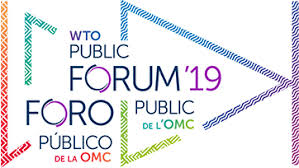Digital trade and health: Opportunities and challenges for developing countries
9 Oct 2019 02:00h
Event report
[Read more session reports from WTO Public Forum 2019]
Mr Philip Stevens (Executive Director, Geneva Network) introduced the topic of the session: the consequences and benefits of digitisation for trade and health. He clarified that the focus particularly concerned developing countries, since digital health services can be adapted to developing countries and delivered at significantly lower costs than traditional health services .
Ms Maíra Flores (Head of Communications, Portal Telemedicina) explained that the organisation’s mission is to use technology to improve healthcare in Brazil, and eventually, to deliver universal quality healthcare in Brazil. She explained that the success of Portal Telemedecina technology rests in its interoperability, which allows it to be connected to most medical equipment in Brazil. She also illustrated the functioning of an artificial intelligence (AI)-powered platform for health services. Realised in partnership with Google, the existing algorithm in this platform analyses vast amounts of medical imagery to perform a diagnosis. The output is always submitted to a doctor for a final diagnosis. The interaction between the AI system and a doctor allows the algorithm to be trained and perfected. Flores also mentioned that the portal has been collaborating with the health insurer, UNIMED, to allow more affordable lines of insurance packages. The collaboration with the BRF corporation, a global food company, reduces costs of employees’ mandatory medical check-ups. A future collaboration with the Sao Paulo public healthcare system will integrate multiple healthcare systems in the city.
Ms Andrea Tartakowsky Pezoa (Senior Research and Policy Officer, Pathways for Prosperity Commission) presented on the potential benefit of data driven and digitalised health services for developing countries. She considered that technology can have a positive effect on healthcare, providing faster communication with healthcare professionals, more educational opportunities for remote students, and more efficient services, particularly in regard to monitoring disease outbreaks. She then illustrated five visions regarding the improvements that technology will bring to the delivery of health and education services. First, technology can create responsive learning systems bridging the gap between medical research and practice. Second, technology can help in the identification of at risk populations. Third, technology allows health services to tailor healthcare and education to individual needs. Fourth, technology can re-define the roles of educators and healthcare workers by reducing the time spent on routine tasks. Fifth, technology will bring quality healthcare and education to remote areas. Tartakowsky concluded her presentation by considering that these future visionary benefits will have to rest on ‘digital building blocks’, namely capital investment in digital infrastructure, the address of policy gaps, regulation of cross-border data flows, and the protection of highly-sensitive healthcare data.
Mr Nigel Cory (Associate Director, Trade Policy, Information Technology and Innovation Foundation Think tank) talked about data flows and data governance. More specifically, he specified that the free flow of data as a part of a country’s national digital strategy can have important results for the delivery of healthcare services and the development of new drugs, especially when data is fed into AI technology. Cory considered that data is difficult to collect and to exchange because information from remote areas is often missing. Moreover, data is often costly to access. He explained that presently ‘real time data’ is often generated by many Internet of Things (IoT) devices and applications (e.g. biometric, fitness data, and air quality control data), which could be used to help researchers develop and improve drugs. Moreover, existing regulatory requirements (e.g. for data to be stored locally) may further hinder data flows. He concluded his presentation by saying that the benefits of data-driven health services and data privacy and protection concerns are not mutually exclusive: new trades rules and provisions have an important role to play in reconciling the two.
Mr Andrew Staines (Ambassador, Deputy Permanent Representative of the United Kingdom to the WTO) first considered that in the case of developing countries, it is important to harness the potential of the technology already in use to improve the healthcare system. Staines then focused on the on-going e-commerce discussions within the WTO. The current trade architecture is still anchored in laws and regulations from 1995 when connectivity was still low and the use of technology still rudimentary. During the 11th Ministerial Meeting of the WTO in Buenos Aires, some countries proposed the Joint Statement Initiative (JSI), in order to start discussions on e-commerce negotiations within the WTO. Staines explained that discussions regarding data are a critical part of these negotiations because bringing together different national and regional approaches to data regulation with the aim of finding a common approach is challenging. In the case of healthcare services, for example, the reconciliation between free data flows and the protection of data is still under debate. The United Kingdom’s approach is focussing on building trust around data and making visible the potential benefits of data flows. He concluded his presentation by welcoming trilateral co-operation among the WTO, the World Health Organization (WHO), and the World Intellectual Property Organization (WIPO) in addressing the trade aspects of e-commerce, the consequences of technology on healthcare services, and the relevant intellectual protection framework. It is important to sustain the positive momentum behind the JSI in order to ensure that future global digital trade rules are inclusive, fair, transparent, and as fit-for-purpose as possible.
Related topics
Related event

